
Bankim Chandra Chattopadhyay was an Indian novelist, poet, essayist and journalist. He was the author of the 1882 Bengali language novel Anandamath, which is one of the landmarks of modern Bengali and Indian literature. He was the composer of Vande Mataram, written in highly Sanskritised Bengali, personifying India as a mother goddess and inspiring activists during the Indian Independence Movement. Chattopadhayay wrote fourteen novels and many serious, serio-comic, satirical, scientific and critical treatises in Bengali. He is known as Sahitya Samrat in Bengali.

The Bengal Renaissance, also known as the Bengali Renaissance, was a cultural, social, intellectual, and artistic movement that took place in the Bengal region of the British Raj, from the late 18th century to the early 20th century. Historians have traced the beginnings of the movement to the victory of the British East India Company at the 1757 Battle of Plassey, as well as the works of reformer Raja Rammohan Roy, considered the "Father of the Bengal Renaissance," born in 1772. Nitish Sengupta stated that the movement "can be said to have … ended with Rabindranath Tagore," Asia's first Nobel laureate.

Abol tabol is a collection of Bengali children's poems and rhymes composed by Sukumar Ray, first published on 19 September 1923 by U. Ray and Sons publishers. It consists of 46 titled and seven untitled short rhymes (quatrains), all considered to be in the genre of nonsense literature.
Kallol refers to one of the most influential literary movements in Bengali literature, which can be placed approximately between 1923 and 1935. The name Kallol of the Kallol group derives from a magazine of the same name. Kallol was the main mouthpiece for a group of young writers starting their careers around that time including Premendra Mitra, Kazi Nazrul Islam, and Buddhadeb Basu. A number of other magazines that followed Kallol can also be placed as part of the general movement. These include Uttara (1925), Pragati (1926), Kalikolom (1926), and Purbasha (1932).
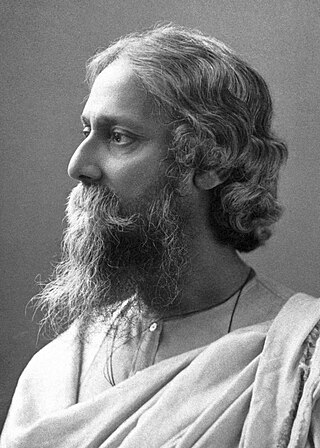
Bengali literature denotes the body of writings in the Bengali language and which covers Old Bengali, Middle- Bengali and Modern Bengali with the changes through the passage of time and dynastic patronization or non-patronization. Bengali has developed over the course of roughly 1,300 years. If the emergence of the Bengali literature supposes to date back to roughly 650 AD, the development of Bengali literature claims to be 1600 years old. The earliest extant work in Bengali literature is the Charyapada, a collection of Buddhist mystic songs in Old Bengali dating back to the 10th and 11th centuries. The timeline of Bengali literature is divided into three periods: ancient (650–1200), medieval (1200–1800) and modern. Medieval Bengali literature consists of various poetic genres, including Hindu religious scriptures, Islamic epics, Vaishnava texts, translations of Arabic, Persian and Sanskrit texts, and secular texts by Muslim poets. Novels were introduced in the mid-19th century. Nobel laureate Rabindranath Tagore is the best known figure of Bengali literature to the world. Kazi Nazrul Islam, notable for his activism and anti-British literature, was described as the Rebel Poet and is now recognised as the National poet of Bangladesh.
The Tagore family has been one of the leading families of Kolkata, India, and is regarded as one of the key influencers during the Bengali Renaissance. The family has produced several people who have contributed substantially in the fields of business, social and religious reformation, literature, art, politics and music. The most prominent figures of this family include Dwarkanath Tagore, a pioneering industrialist; Rabindranath Tagore, Nobel laureate in literature; Abanindranath Tagore, a distinguished artist and more.
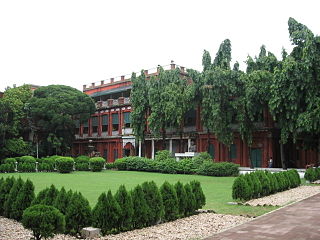
Jorasanko is a neighbourhood of North Kolkata, in Kolkata district, West Bengal, India. It is so called because of the two (jora) wooden or bamboo bridges (sanko) that spanned a small stream at this point.

Supriya Chaudhuri is an Indian scholar of English literature. She is Professor Emerita at Kolkata's Jadavpur University.
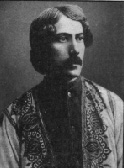
Jyotirindranath Tagore was a playwright, musician, editor, and painter from Bengal. He played a major role in the flowering of the talents of his younger brother, the first non-European Nobel Prize winner, Rabindranath Tagore.

Ananda Lal is an Indian academic and theatre critic. He is the son of Purushottama Lal, founder of Writers Workshop, one of India's oldest creative writing publishers, established in 1958. He is a former Professor of English and Coordinator, Rabindranath Tagore Studies Centre (UGC), at Jadavpur University, Calcutta and has now retired from active service. He currently heads Writers Workshop, translates from Bengali to English, is a theatre critic for The Times of India (Calcutta). While he was a professor at Jadavpur, he regularly directed plays for the Department of English with students in the cast and crew.
Rabindra Kumar Das Gupta was an Indian scholar of Bengali and English literature and a social and cultural commentator. He was considered by his peers as one of the last scholars with equal command of English and Bengali languages.

Swapan Kumar Chakravorty was an Indian academic who was a distinguished Professor of Humanities at the Presidency University, Kolkata.
Susobhan Chandra Sarkar (1900–1982) was an Indian historian.

Sisir Kumar Das (1936–2003) was a linguist, poet, playwright, translator, comparatist and a prolific scholar of Indian literature. He is considered by many as the "doyen of Indian literary historiographers". Almost singlehandedly Das built an integrated history of Indian literature composed of many languages, a task that had seemed to many important scholars of Indian literature to be “a historian’s despair”. His three volumes A History of Indian Literature is credited for having devised hitherto absent methods necessary for situating diverse Indian literary cultures in history. Apart from this, another monumental work in Das’ scholarly oeuvre is the multi-volume English Writings of Rabindranath Tagore, edited by him.

Chinmoy Guha is Professor Emeritus at the University of Calcutta, a Bengali essayist and translator, and a scholar of French language and literature. He has served as the Vice-Chancellor of Rabindra Bharati University and Director of Publications, Embassy of France, New Delhi. Earlier he taught English at Vijaygarh Jyotish Ray College in Kolkata for more than two decades, and French at the Alliance Française and the Ramakrishna Mission Institute of Culture for eleven and five years respectively.
Subodh Chandra Sengupta was an Indian scholar, academic and critic of English literature, known for his scholarship on Shakespearean works. His books on William Shakespeare, which included Aspects of Shakespearian Tragedy, Shakespearian Comedy and Shakespeare's Historical Plays are critically acclaimed for scholarship and academic rigor. He was a professor in the Department of English Language and Literature at Presidency College, Calcutta, and after retirement from Presidency College, became Professor of English Language and Literature at Jadavpur University, Calcutta, as well as a professor of English literature at Ramakrishna Mission Residential College, Narendrapur, an autonomous college in Greater Calcutta under the University of Calcutta. The Government of India awarded him the third highest civilian honour of the Padma Bhushan, in 1983, for his contributions to literature and education.
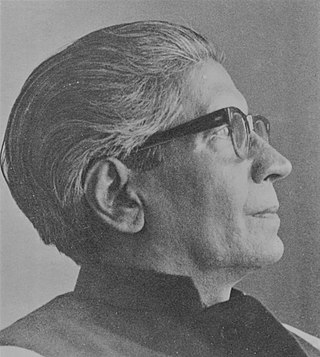
Abu Sayeed Ayyub was an Indian philosopher, teacher, literary critic and writer in both Bengali and English. Though born into a traditional, Urdu-speaking, Muslim family in Calcutta (Kolkata), he was so deeply captivated in his early teenage by the poems of the Indian Nobel Laureate Rabindranath Tagore that he taught himself Bengali so as to appreciate Tagore better. Later, when he started to write, it was mostly in his adopted language, Bengali. During the initial part of his writing career, Ayyub wrote on aesthetics, religion and socialism. However, it was his philosophical and scientific analysis of creative literature - in particular the poetry and the drama of Tagore - that finally brought him wide recognition as "one of the most serious and original Tagore scholars". Ayyub is also credited with "co-editing the first anthology of modern Bengali poetry". He taught philosophy at the University of Calcutta, the Visva-Bharati University and the University of Melbourne, and edited the literary and philosophical journal Quest.
Rosinka Chaudhuri is Professor of Cultural Studies and also current Director at the Centre for Studies in Social Sciences, Calcutta (CSSSC). She is a member of St Hugh's College, Oxford, and has held visiting positions at University College London, King's College London, Delhi University, Cambridge University and Columbia University.
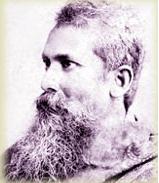
Dwijendranath Tagore was an Indian poet, song composer, philosopher, mathematician and painter. He was one of the pioneers of shorthand and notation in Bengali script. He was the eldest son of Debendranath Tagore and the eldest brother of Rabindranath Tagore.













